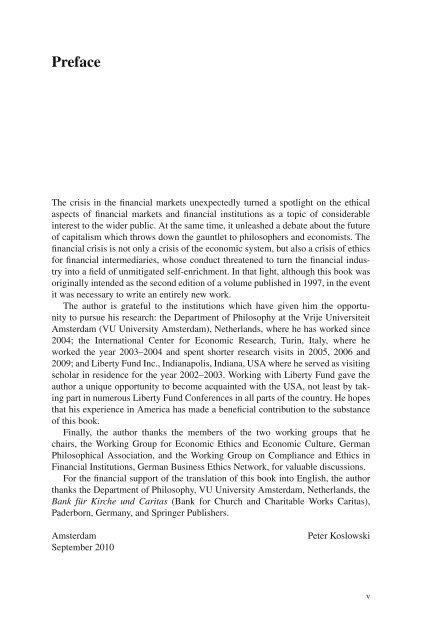The Ethics of Banking: Conclusions from the Financial Crisis (Issues ...
The Ethics of Banking: Conclusions from the Financial Crisis (Issues ...
The Ethics of Banking: Conclusions from the Financial Crisis (Issues ...
You also want an ePaper? Increase the reach of your titles
YUMPU automatically turns print PDFs into web optimized ePapers that Google loves.
Preface<br />
<strong>The</strong> crisis in <strong>the</strong> financial markets unexpectedly turned a spotlight on <strong>the</strong> ethical<br />
aspects <strong>of</strong> financial markets and financial institutions as a topic <strong>of</strong> considerable<br />
interest to <strong>the</strong> wider public. At <strong>the</strong> same time, it unleashed a debate about <strong>the</strong> future<br />
<strong>of</strong> capitalism which throws down <strong>the</strong> gauntlet to philosophers and economists. <strong>The</strong><br />
financial crisis is not only a crisis <strong>of</strong> <strong>the</strong> economic system, but also a crisis <strong>of</strong> ethics<br />
for financial intermediaries, whose conduct threatened to turn <strong>the</strong> financial industry<br />
into a field <strong>of</strong> unmitigated self-enrichment. In that light, although this book was<br />
originally intended as <strong>the</strong> second edition <strong>of</strong> a volume published in 1997, in <strong>the</strong> event<br />
it was necessary to write an entirely new work.<br />
<strong>The</strong> author is grateful to <strong>the</strong> institutions which have given him <strong>the</strong> opportunity<br />
to pursue his research: <strong>the</strong> Department <strong>of</strong> Philosophy at <strong>the</strong> Vrije Universiteit<br />
Amsterdam (VU University Amsterdam), Ne<strong>the</strong>rlands, where he has worked since<br />
2004; <strong>the</strong> International Center for Economic Research, Turin, Italy, where he<br />
worked <strong>the</strong> year 2003–2004 and spent shorter research visits in 2005, 2006 and<br />
2009; and Liberty Fund Inc., Indianapolis, Indiana, USA where he served as visiting<br />
scholar in residence for <strong>the</strong> year 2002–2003. Working with Liberty Fund gave <strong>the</strong><br />
author a unique opportunity to become acquainted with <strong>the</strong> USA, not least by taking<br />
part in numerous Liberty Fund Conferences in all parts <strong>of</strong> <strong>the</strong> country. He hopes<br />
that his experience in America has made a beneficial contribution to <strong>the</strong> substance<br />
<strong>of</strong> this book.<br />
Finally, <strong>the</strong> author thanks <strong>the</strong> members <strong>of</strong> <strong>the</strong> two working groups that he<br />
chairs, <strong>the</strong> Working Group for Economic <strong>Ethics</strong> and Economic Culture, German<br />
Philosophical Association, and <strong>the</strong> Working Group on Compliance and <strong>Ethics</strong> in<br />
<strong>Financial</strong> Institutions, German Business <strong>Ethics</strong> Network, for valuable discussions.<br />
For <strong>the</strong> financial support <strong>of</strong> <strong>the</strong> translation <strong>of</strong> this book into English, <strong>the</strong> author<br />
thanks <strong>the</strong> Department <strong>of</strong> Philosophy, VU University Amsterdam, Ne<strong>the</strong>rlands, <strong>the</strong><br />
Bank für Kirche und Caritas (Bank for Church and Charitable Works Caritas),<br />
Paderborn, Germany, and Springer Publishers.<br />
Amsterdam Peter Koslowski<br />
September 2010<br />
v

















